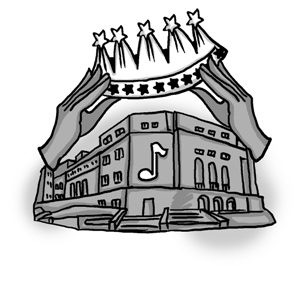More to cultural venues than a name

Illustration: Lu Ting/GT
The Shanghai Concert Hall was recently renamed the Sennheiser Shanghai Concert Hall to mark its strategic cooperation with the German manufacturer of headphones, microphones and wireless transmission systems.
The news triggered heated discussion among the public, with many questioning whether it is appropriate for a prestigious Chinese cultural venue to take on the name of a corporate sponsor.
Chen Gang, a well-known Shanghai-born composer, commented on his microblog that it was a shame that the venue, which has borne the same name for over 80 years, should have it changed in such a low-key manner.
While I understand such well-meant concerns, I still think the decision to change the name is wise in terms of the concert hall's long-term development.
To begin with, the cooperation between Shanghai Concert Hall and the leading German audio company can bring a stream of financial and cultural benefits.
According to the deal, Sennheiser will not only pay a considerable amount of money for the sponsorship of the concert hall, but will also help upgrade the venue's facilities.
The company will aid in the launch of an aero-acoustical reconstruction project for one of the concert hall's multifunctional underground theaters. Moreover, a new recording studio equipped with state-of-the-art facilities will be set up to record live concerts for radio, television and Internet broadcast in an attempt to make highbrow shows reach a wider audience.
Officials with the concert hall also stated that from next season, local audiences can enjoy performances at a more reasonable price - another beneficial result of the recent deal.
Also, I'd like to point out that in the West it's a common practice for public cultural venues to bear their sponsors' names.
One example is Avery Fisher Hall in New York. The 2,738-seat concert hall, home to the New York Philharmonic and part of the Lincoln Center for the Performing Arts complex, was designed by Max Abramovitz and was opened in 1962 as Philharmonic Hall. It was renamed in 1973 after Avery Fisher, one of the board of directors of the Philharmonic, donated some $10.5 million to the orchestra.
A more recent and widely known case is that of the Dolby Theatre on Hollywood Boulevard in Los Angeles. The venue, which hosts the annual Academy Awards ceremonies, was designed by David Rockwell and opened in November 2001. It took on the Dolby name after a sponsorship deal signed with Dolby Laboratories in May 2012. Dolby also upgraded the theater's sound system. The theater was originally called the Kodak Theatre under a $75-million naming-rights contract signed by the famous camera film company Eastman Kodak Company. Yet, the theater's name was temporarily changed to The Hollywood and Highland Center in early 2012 when Kodak filed for bankruptcy protection.
Coming back to Shanghai, the Concert Hall is not the first cultural venue to be renamed after a foreign sponsor. Today's Mercedes-Benz Arena, a live performance stadium on the eastern bank of Huangpu River, is the former Expo Performance Center. The world-famous German automaker signed a 10-year deal for naming rights to the performance center after the World Expo 2010 in Shanghai.
So while I understand that the change of name of a much-beloved venue can make some people unhappy, overall the benefits outweigh the negatives. And of course, in our day-to-day lives, we can still refer to it by its original name.